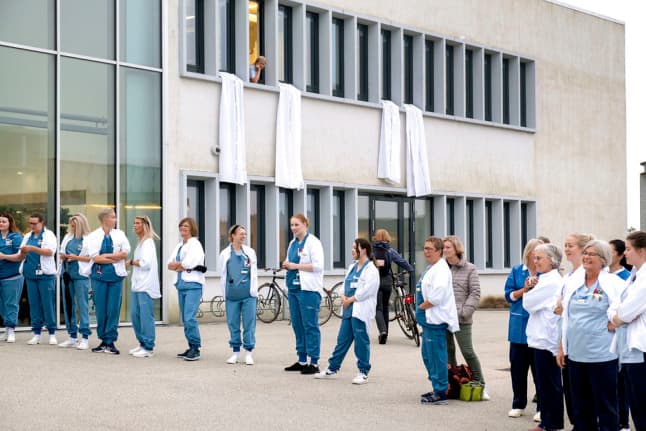Glimmer of hope for Danish nurses’ conflict with committee set to scrutinise pay

A special committee is to assess wages in Denmark’s public sector, offering hope for long term improvement on wage equality for nurses, who have been protesting over the issue for months.
Parliament in August intervened to settle a dispute over a new collective bargaining agreement between the nurses’ trade union DSR and regional health authority employers, ending union-sanctioned strikes which had been ongoing throughout the summer.
Strikes authorised and announced by unions, when negotiations over new working conditions break down, are permitted and recognised as a legitimate part of Denmark’s labour model.
But nurses have continued to protest against the agreement by conducting unauthorised walkouts in September and October. That action remains ongoing despite the Arbejdsretten labour court issuing fines against nurses involved in it and DSR urging them to end the walkouts.
EXPLAINED: Why has the government intervened in Denmark’s nurses strike?
A committee has now been set down to scrutinise wage structures in Denmark’s public sector, offering a glimmer of hope of finding a way out of the deadlock.
Economics professor and former head of the Danish Economic Councils Torben M. Andersen will lead the commission, the Ministry of Employment said in a statement.
In June, nurses voted against accepting the collective bargaining agreement, arguing that wages for their profession are lagging behind pay levels in other fields.
It is that agreement that was later implemented via the government intervention.
The wages committee will analyse pay structures and the consequences of any changes to them. The results of the work are to be presented as soon as possible, although the final deadline is the end of 2022.
Minister for employment and equality Peter Hummelgaard welcomed the appointment of the committee and recognised that Denmark does not have wage equality.
“But we must also recognise that it’s a complex debate and we need to make an informed basis that can form the background to future collective bargaining negotiations in the public sector,” the minister said.
“This is important work which the government obliges itself to follow up on,” he added.
Several professional sectors in Denmark, including nurses, have pointed to a 1969 wage law as the culprit in leaving a lot of female-dominated professions lagging on pay.
The 1969 wage reform, tjenestemandsreformen, placed public servants on 40 different pay grades, with sectors traditionally seen as dominated by women, such as nursing and childcare, given lower pay than jobs such as teacher or police officer.
A petition demand an end to the decades-old wage hierarchy failed in parliament earlier this year.
READ ALSO: Why Danes want to boost equality by scrapping a 1969 public sector pay reform
Comments
See Also
Parliament in August intervened to settle a dispute over a new collective bargaining agreement between the nurses’ trade union DSR and regional health authority employers, ending union-sanctioned strikes which had been ongoing throughout the summer.
Strikes authorised and announced by unions, when negotiations over new working conditions break down, are permitted and recognised as a legitimate part of Denmark’s labour model.
But nurses have continued to protest against the agreement by conducting unauthorised walkouts in September and October. That action remains ongoing despite the Arbejdsretten labour court issuing fines against nurses involved in it and DSR urging them to end the walkouts.
EXPLAINED: Why has the government intervened in Denmark’s nurses strike?
A committee has now been set down to scrutinise wage structures in Denmark’s public sector, offering a glimmer of hope of finding a way out of the deadlock.
Economics professor and former head of the Danish Economic Councils Torben M. Andersen will lead the commission, the Ministry of Employment said in a statement.
In June, nurses voted against accepting the collective bargaining agreement, arguing that wages for their profession are lagging behind pay levels in other fields.
It is that agreement that was later implemented via the government intervention.
The wages committee will analyse pay structures and the consequences of any changes to them. The results of the work are to be presented as soon as possible, although the final deadline is the end of 2022.
Minister for employment and equality Peter Hummelgaard welcomed the appointment of the committee and recognised that Denmark does not have wage equality.
“But we must also recognise that it’s a complex debate and we need to make an informed basis that can form the background to future collective bargaining negotiations in the public sector,” the minister said.
“This is important work which the government obliges itself to follow up on,” he added.
Several professional sectors in Denmark, including nurses, have pointed to a 1969 wage law as the culprit in leaving a lot of female-dominated professions lagging on pay.
The 1969 wage reform, tjenestemandsreformen, placed public servants on 40 different pay grades, with sectors traditionally seen as dominated by women, such as nursing and childcare, given lower pay than jobs such as teacher or police officer.
A petition demand an end to the decades-old wage hierarchy failed in parliament earlier this year.
READ ALSO: Why Danes want to boost equality by scrapping a 1969 public sector pay reform
Join the conversation in our comments section below. Share your own views and experience and if you have a question or suggestion for our journalists then email us at [email protected].
Please keep comments civil, constructive and on topic – and make sure to read our terms of use before getting involved.
Please log in here to leave a comment.